“Piper, sit thee down and write
In a book, that all may read.”
So he vanished from my sight,
And I plucked a hollow reed,And I made a rural pen,
And I stained the water clear,
And I wrote my happy songs
Every child may joy to hear.– William Blake, “Introduction” (Songs of Innocence)
Jeff Sharlet, in his book The Family, wrote about the continuous strain of religious fundamentalism that has defined American history. He asserted that America is not a free, radical country with occasional religious revivals – from Jonathan Edwards to Billy Graham – but that America is a puritan country with occasional radical tendencies.
Season One of Boardwalk Empire bears that out. America is defined primarily by its innocence. Shielded from the Great War by the span of the Atlantic, it has not suffered the loss of manhood that shattered Europe. Its religions are the youthful, enthusiastic religions of prairie tents, not the ancient corrupt religions of England and Rome. America is a young, rich country and still innocent. But every now and then, a crisis forces America to grow up in a hurry. Prohibition, a movement inspired by the innocent belief that masking a symptom can cure a cause, has sparked that crisis. The experience it brings on will age America rapidly.
As Noel Murray noted in his recaps at the AV Club, the primary means of communication in Boardwalk Empire is the parable. In the first episode, Nucky tells a story about how he had to club rats as a child because his father bankrupted the family for drink. Margaret puts Lucy in her place with the story of the raggedy old man and his dancing monkey. Chalky intimidates the Klan Cyclops by recounting the tale of his father’s lynching. Jimmy is full of tales: a German soldier caught in barbed wire, a yachting cruise with his mother and a suitor, etc. A century before Facebook, storytelling was the dominant form of social media.
Why tell a story instead of just lecturing someone? Why does Chalky tell a folksy tale of heartbreak to a man he’s about to torture, instead of just beginning the torture? Why does Jimmy tease Sheridan’s goon with a war story, as opposed to growling generic threats or staring menacingly? What’s the difference between a story and other forms of rhetoric?
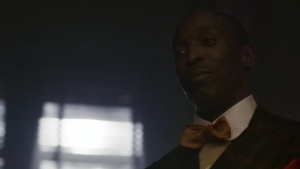
Just sit right back and you'll hear a tale, a tale of a lynching crew ...
By telling a story from your past, you tell the listener: I have been there. Speaking from experience gives your words more weight. This is especially important in an era where media were limited and stratified. Atlantic City has a few newspapers, which were already becoming consolidated in the 20s under the Press of Atlantic City (which is where Walter Edge got the wealth to run for Governor, prior to becoming Senator). There aren’t a lot of radio stations and most of them get their news from the same source. So if you want to tell a story that’s different from the party line, you need an extra boost. Speaking from experience gives you that advantage.
Consider the scene where Margaret tells Lucy that “maybe your cunny isn’t the draw you think it is.” The story she tells has nothing to do with, er, cunny. It’s a rather parochial story about her childhood in rural Ireland. But it lets her deliver a cutting punchline. That makes it more effective than just saying to Lucy, “You’re white trash.”
Jimmy, Margaret and our other protagonists certainly seem to be stronger for their experience. Jimmy triumphs over more powerful foes – the Sheridan gang, for instance – because of what he knows about tactics and misdirection. Margaret succeeds where Lucy (and other girls) failed: gaining not just Nucky Thompson’s affection but his trust as well. Others, with a more naive view of the world, take longer to catch up, or even fall by the wayside. Capone loiters in the shadow of Tessio Torrio’s disregard until he proves that he’s matured. Lucy falls from grace with remarkable speed. And Nan Britton, Warren Harding’s mistress, pines at home in the naive hope that her President will save her.
Experience – as reflected by parables – makes the difference in Atlantic City. But experience comes with a price.
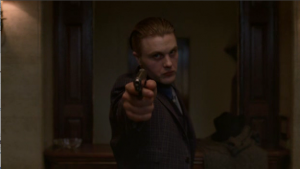
He stole this from a movie that ... erm ... doesn't exist ... yet ...
Jimmy is clearly traumatized by combat. He wakes up screaming in German; he’s prone to unpredictable mood swings. All he talks about is his time overseas (“we used to talk about books,” his fiancee complains). Margaret gains a great deal of experience just by living in Nucky’s presence, and we see it harden her. She manipulates Nucky into lifting the levy on Mme. Jeunet’s store, then holds Jeunet over the barrel to extort a reward out of her: “my daughter didn’t save your shop.” She sells out the Suffragettes to deliver more votes into Bader’s pocket. By the final episode, she’s drinking again.
Every main character, who grows stronger through their experience, is mirrored by a minor character who’s been weakened by it. Jimmy’s dark mirror is the harrowing Richard Harrow, maimed veteran and expert sniper. Harrow doesn’t blink – with either eye – when he discovers that Jimmy’s a gangland killer, nor when Jimmy asks him to kill again. By the penultimate episode, Harrow’s offering to kill civilians – the d’Alessios’ mother – if it’ll make Jimmy’s life easier.
Margaret is mirrored by Annabelle, her neighbor in the Kept Women District of Atlantic City. Annabelle flatters and indulges Margaret, cooing at her jewelry and urging her to eat sweets. She seems to know the game better than Margaret: how to keep a man just interested enough to stay on his payroll. But living this life too long has made her heartless. When her beau Harry Prince goes bankrupt, she calls him an idiot and stalks out on him. She shows up at Nucky’s office weeping, then drops the tears in the hopes that she can seduce some money out of him. Though she ends S1 in safe hands – George Baxter, silverware man, always good for a quickie on the backroads of Atlantic County – we realize her star will never rise much higher.
These minor characters are warnings. You can’t walk too far down the dark path without losing something of yourself. Both characters wear prosthetics in order to pass socially – Harrow a tin mask; Annabelle a series of stylish wigs. We may like them and we may respect their competence at playing the game. But we don’t want our protagonists to be like them.
Our main characters recognize the road that experience leads them down. They want to turn back. They want to reclaim the innocence they lost. Jimmy thinks that he can move back in with Angela and his boy after not having seen them for three years. It doesn’t occur to them that they’d have moved on. It also doesn’t occur to him that a traumatized war veteran doesn’t make a very good father. And it definitely doesn’t occur to Jimmy that a murderer who comes and goes without warning doesn’t make for a good home life. He can’t see what’s painfully obvious to the audience: that his fiancee Angela is stifling under his casual brutality. He thinks she wants another child, or wants him to be around more. His desire to provide a normal family life – to return to innocence – means he has to be better at his job. This means he has to kill more, which drives his family further away.
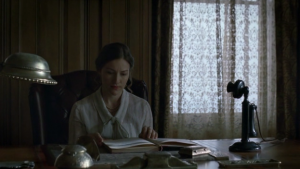
Oh, whoops.
Margaret feigns ignorance in Nucky’s business for as long as she can. When she exploits Nucky’s infatuation in order to get the warehouse behind her home shut down, she seems disappointed that it’s in operation the next evening. When Nucky puts her up in a three bedroom townhouse, she doesn’t ask how a county treasurer could get so much money. Even when the evidence of Nucky’s illegal dealings surfaces, in the form of his private ledger, she sits and stares at it all night until “accidentally” flipping it open. One’s reminded of a child, convincing herself that the bag of cookies fell out of the cabinet by mistake and that she didn’t really steal them. Margaret has to regress to this level of innocence to shield herself.
Both Jimmy and Margaret have been through the looking glass. The image resurfaces several times in Margaret’s case: she stares into a mirror at the end of Episode 10 (“The Emerald City”), wondering at how far she’s willing to go for Nucky. Nucky flings her bottle of Lysol at this same mirror after their argument in Episode 11 (“Paris Green”). Jimmy doesn’t confront as many literal mirrors, though he looks in the mirror just before his prostitute girlfriend Pearl shoots herself and just after the Commodore tells him that the wrong man is running Atlantic City.
Everyone wants experience. Everyone wants war stories – the ability to command a crowd’s respect by telling them Where You’ve Been and How The World Really Is. But everyone also wants the crowd: the quiet evenings with dim lighting in a parlor full of laughs. No one wants the cold mud in the trenches or the antiseptic hospital rooms. The twin pulls of innocence and experience threaten to tear our protagonists apart.
And what about Nucky Thompson?
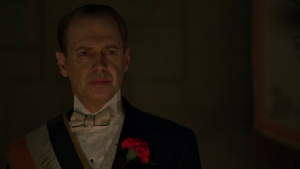
The soberest man in Atlantic City.
Nucky straddles the boundary between innocence and experience. Just as Atlantic City is a gateway to the country – a port through which both immigrants and illegal booze flow – so its treasurer, Nucky Thompson, is a gateway to experience. He provides Jimmy with the connections that turn him into a gangster and ushers Margaret into the world of politics.
But he’s more than just a catalyst – Nucky is changed himself. The world of backroom politics may look corrupt to a gentrified audience, but it represents a simpler and more innocent time. The graft of the Republican machine in Atlantic City runs like a business. Everyone pays on time, Nucky keeps a ledger, and the best chiselers get rewarded. Prohibition heralds the era of the gangster, however. Gangsters operate in the black, Jewish and Italian ghettos – all places that respectable society dare not go. Gangsters don’t obey the prerogative of profit – they settle their disputes through shoot-outs in the alleys.
Several times throughout S1, Nucky is asked – often point-blank, often by Jimmy – if he’s going to become a gangster or not. He can’t keep trafficking in illegal hooch without entering farther into the world of organized crime: dealing with immigrants, ordering murders and covering up shady deals. Nucky is also challenged by Margaret (and partly by Chalky) to live up to his campaign promises. He can’t just mouth platitudes to win votes: the Republican Party has to act like the Party of Lincoln.
And as much of a haggler as he is, Nucky feels the pangs of lost innocence, too. Every time he looks at a babe in arms or recalls his Catholic upbringing, Nucky retreats into introspection. He doesn’t sink into the same reveries as his entourage does: high-stepping around the parlor with Eddie Cantor, watching stag films with his brother Eli, laughing at the Democratic candidate’s prospects. Always in the back of his mind is that nagging reminder that all of this came from corruption. None of it is earned.
By the end of S1, Nucky has made his peace with his life in both worlds. He orders the execution of the remaining d’Alessio brothers, then stages a press conference announcing their arrest. He throws a massive victory party for the Republican ticket, then invites Chalky White – unheard of at the time – and publicly embraces the widow Schroeder. He’s comfortable living in both worlds. And if the look on his face as the sun rises over the boardwalk suggests some lingering doubts, he can sleep on those.
S1 ends with Warren Harding’s victory speech and his pledge for a return to normalcy. But Jimmy, Margaret and Nucky have had their eyes opened by the first year of Prohibition. They know that the world is full of violence, deceit and callousness. It’s everywhere, from the government of Atlantic County to the streets of Chicago to the Bureau of Prohibition. There is no “normal” to return to. The three of them are wiser, and perhaps a little sadder, for knowing. Season 2 will tell us if they’re stronger.
Hear the voice of the Bard,
Who present, past, and future, sees;
Whose ears have heard
The Holy Word
That walked among the ancient trees;Calling the lapsed soul,
And weeping in the evening dew;
That might control
The starry pole,
And fallen, fallen light renew!– William Blake, “Introduction” (Songs of Experience)
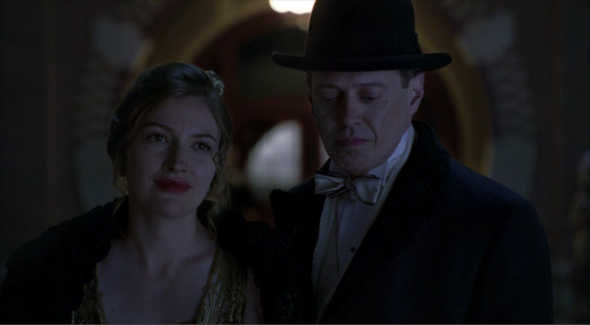
“Democrat” candidate? Shouldn’t that be “Democratic” candidate?
I don’t like that phrasing. It’s a useless quibble and I know the official name of the party has the “-ic” on the end. I just don’t like the declension.
That’s a fairly common right-wing pundit mistake, actually, and I’m a little surprised to see it here. It stems from reluctance to conflate “Democratic” (belonging to the United States Democratic Party) with “democratic” (of a democracy, namely that of the United States).
I say there’s no reason to be afraid of homophones; let’s make homophobia a thing of the past!
When right-wing pundits and politicians say it that way – and many of them always use “Democrat” as an adjective – it’s intentional. They’re doing it because “Democrat” sounds harsher and less favorable than “Democratic”, perhaps closer to “rat”, perhaps closer to “crap”.
Perich, this was a wonderfully insightful article. Have you been taking notes all season, or did you rewatch the whole thing for this article (or both)? You called attention to a number of things I hadn’t even considered, and you’ve made me look forward to watching through this season again.
Neither, really. To drop the objective facade for a moment: the first few episodes were slow and uneven, so it was pretty easy to forget those. Once the show started hitting its stride, the themes were clear enough that it wasn’t hard for me to identify moments (“where do mirrors show up? oh, yeah!”).
Glad I added some re-watch value to the show!
Torrio = Boardwalk Empire. Tessio = Abe Vigoda.
It’s the smart move. Tessio was always smarter.
(Fixed)